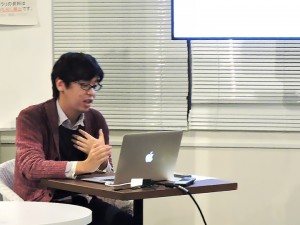 |
The theme of Mr. Yoshida’s presentation was his recommendation of an “Agriculture Philosophy Café”. Participants from a variety of fields, industries, and generations attend the GLAFS Evening Salons. Mr. Yoshida gave a talk describing how he would like to offer a place where discussions can be held to find out what participants with various backgrounds think about the concept of “agriculture.”
The objective of an agriculture philosophy café is to provide opportunities for participants to raise questions and develop their thinking. Participants are able to enjoy the process of changing their thinking by listening to the discussion, which is conducted at a slow pace.
Various topics regarding agriculture were discussed, including the decreasing food self-sufficiency ratio, deserted cultivated land, the various functions of agriculture, and the absence of successors in the agricultural field. There were many questions regarding these issues from participants, as indicated below.
1. What kinds of agricultural products should be produced, and how many of them should Japan be responsible for?
2. How can farms produce safe food?
3. Should the principle of market mechanisms be introduced in agricultural industry?
4. How can we provide people with agricultural experiences that are not agricultural labor?
5. How should we foster successors in the agricultural industry?
6. How can we introduce topics to people in urban areas and help them start thinking about agriculture in their own lives?
7. Is agriculture a necessary industry for Japan?
Participants chose one “question” to talk about by picking one question from the above or by integrating a number of questions.
For instance, a question like, “how can we encourage people in urban areas to maintain agricultural businesses?” arises if we combine questions #4, #5, and #6.
Due to limited time, participants were not able to talk about all of the issues, however, through the processes of brainstorming questions and integrating them, participants had to revise fundamental aspects of their ideas, which was very exciting and inspiring. |

